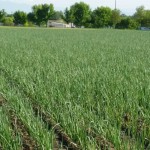In a move to meet requirements from domestic and foreign receivers, onion growers and shippers throughout the United States are taking advantage of Global Food Safety Initiative training sessions offered by governmental agencies and third-party auditors.
Among handlers from the Northwest participating in the program is Bill Trask, food safety director of Baker Packing Co. in Ontario, OR, and 2016 president of the Idaho-Oregon Fruit and Vegetable Association. Trask attended a May 18 and 19 GFSI training session in Portland sponsored by the Oregon Department of Agriculture and WQS, an independent operation that provides third-party certification, inspection and training.
Information about the Portland sessions can be found at both the ODA and WQS web sites, http://www.wqscert.com/wqscert/en/wqs/visualizar/codwqs/3/who-we-are.html and https://services.oregon.gov/ODA/programs/MarketAccess/MACertification/Pages/GFSI.aspx.
In addition the training is offered online at http://www.wqscert.com/wqscert/en/agenda/visualizar/codcurso_agenda/23/globalg-a-p-version-5-0-1-online.html.
Bill told OnionBusiness.com training in Global GAP is increasingly important as end users require the highest level of food safety – a status that is upgraded as technology and science become more precise. Global GAP certification is accepted worldwide, and large receivers including Costco, McDonalds, Walmart, Nestle have indicated they are considering Global GAP as for a standard from their suppliers.
While many growers already have GAP certifications such as Primus in place, larger receivers want to keep pace with the evolving stringency of food safety; Global GAP certification is described as an upgrade over GAP audits being conducted.
In the end, “It’s about marketing your product to the customer,” Trask said. “With all of the information available to the end users now, many want the latest and greatest level of food safety and the Global GAP is being promoted as such.”
He added that the audit looks at “… the whole farm and increased reporting and monitoring some areas that haven’t been in the past, which creates more work for the grower, but at the end of the day, it’s about giving the customer what they want.”
Many of the Global GAP audit’s components address the revised FSMA rules, but in some areas FMSA standards may be higher, Trask said. In those cases, the higher standards prevail.
“Of course with the FSMA guidelines continuing to evolve, it is still a waiting game on how the GAP process will be impacted, but for now, customers are looking at the Global GAP to ensure a high level of food safety,” he said.


